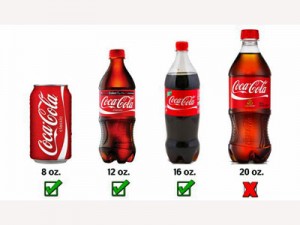 You have, no doubt, heard the statistics about obesity in the U.S: Nearly forty percent of adults and nineteen percent of youth are obese, the highest rate the country has ever seen, according to the most recent data from the National Center for Health Statistics. We hear all sorts of reasons why people gain weight such as too many sugary drinks, not enough physical activity, and a lack of access to healthy foods. [Read more…]
You have, no doubt, heard the statistics about obesity in the U.S: Nearly forty percent of adults and nineteen percent of youth are obese, the highest rate the country has ever seen, according to the most recent data from the National Center for Health Statistics. We hear all sorts of reasons why people gain weight such as too many sugary drinks, not enough physical activity, and a lack of access to healthy foods. [Read more…]
New Evidence Links Sugary Drinks and Obesity
Weight-control: The size of your plate matters!
 Here at EBL, we’ve written regularly about the data available on obesity for two reasons. First, obesity is a major health problem in the U.S. affecting millions of adults and children. Second, there is a lot of new evidence on innovative approaches to tackling this health problem. [Read more…]
Here at EBL, we’ve written regularly about the data available on obesity for two reasons. First, obesity is a major health problem in the U.S. affecting millions of adults and children. Second, there is a lot of new evidence on innovative approaches to tackling this health problem. [Read more…]
The evidence on super-sized soft drinks
 Next year, New York City residents must say good-bye to their super-sized sodas and Double Big Gulps. Beginning in March, the city will limit to 16 ounces the size of soft drinks sold at restaurants, street carts, movie theaters and sporting venues. The New York City Board of Health passed the proposal last month in an effort to reduce the consumption of sugary drinks thought to contribute to the nation’s obesity epidemic.
Next year, New York City residents must say good-bye to their super-sized sodas and Double Big Gulps. Beginning in March, the city will limit to 16 ounces the size of soft drinks sold at restaurants, street carts, movie theaters and sporting venues. The New York City Board of Health passed the proposal last month in an effort to reduce the consumption of sugary drinks thought to contribute to the nation’s obesity epidemic.
But what evidence do we have about sugary soft drinks and weight gain and harm our health? We know that sugar-sweetened drinks account for nearly half of the total added sugars Americans consume and 7 percent of our total calories. But what impact does that have on our health?
New York Times writer Jane Brody also provides an overview of some of the evidence on this topic in her column this week. There are also several systematic reviews that tell the story:
- A 2007 meta analysis in the American Journal of Public Health reviewed 88 studies that examined the association between soft drink consumption and nutrition and health outcomes. The analysis found consuming soft drinks led to increased energy intake and body weight, and was associated with lower intakes of milk, calcium, and other nutrients. It also found an association between soda intake and diabetes.
- Another systematic review, published in the American Journal of Clinical Nutrition in 2006 – which included 30 cross-sectional, prospective and experimental studies looking at the relationship between sugary soft drink consumption and weight gain – concluded that sugary soft drinks are associated with weight gain and obesity.
- A third review published in Cambridge University’s Nutrition Research Reviews in 2008 came up with inconclusive results. The review examined 44 epidemiological studies and interventions and six meta-analyses – all looking at the relationship between sugary soda consumption and obesity. The author concluded that while sugary soft drinks are a source of calories, there is little evidence that they cause more weight gain than other sources of calories. He said the impact of sugary sodas on weight gains depends on variables including how much soda is consumed each day and the formulation of the specific drink. His review also concluded that consuming large amounts of sugary soft drinks on a daily basis is most directly associated with weight gain.
So, did the New York City Board of Health make an evidence-based decision in limiting sugary soft drink sizes? I think the answer is yes. While there is some mixed data on the association of soft drink consumption and weight gain, the evidence makes it abundantly clear that consuming large amounts of soda is the major problem. By limiting soft drinks sizes, the City is essential legislating the old adage, “Moderation in all things.”


